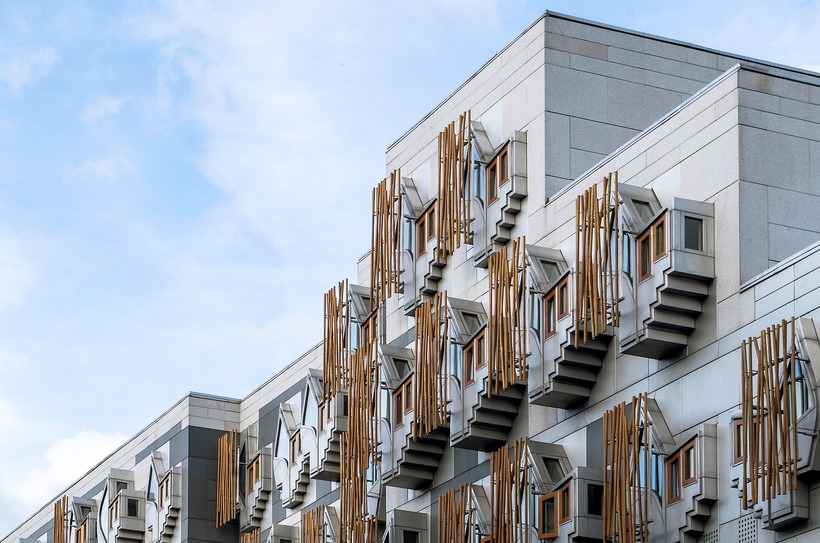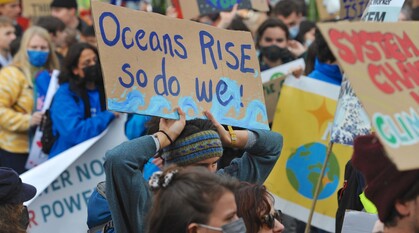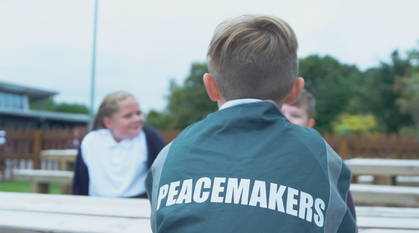A reflection on 25 years of the Scottish Parliament
As the Scottish Parliament celebrates its 25th anniversary, Sarah Komashko reflects on Quaker engagement.

Quaker engagement with the Scottish Parliament builds on a rich history of Quaker political involvement, from the petitions by Margaret Fell and George Fox in the 1600s, to the fifty years of quiet diplomacy in the Quaker UN Offices, to Quakers in Britain's work influencing Westminster politicians.
The development of Quakers in Scotland's work
Having engaged first with Holyrood Parliamentarians through the Scottish Churches Parliamentary Office, by 2011, Quakers in Scotland recognised the need for a distinctively Quaker voice speaking to the Scottish Parliament.
In 2012, a Parliamentary Liaison Function Group was formed to advocate on Trident, marriage equality, and criminal justice, and to create resources for use at a local level by local meetings and individual Quakers. To increase effectiveness, in 2015 the part-time role of Parliamentary Engagement Officer was created to work with the Parliament Engagement Working Group, supported by Quakers in Britain and aligned with the Britain-wide work.
Challenging militarism
An early concern of the Scottish Parliamentary work was militarisation, starting with a single Quaker's individual concern and expanding into a significant project. For two years, we sent MSPs white peace poppies and information about the white poppy initiative, some of which were then worn in Parliament.
This initiative evolved into a partnership with Forces Watch to oppose military presence in Scottish schools. A petition lodged by former Parliamentary Engagement Officer Mairi Campbell-Jack gained over a thousand signatures, resulting in a report recommending a Children's Rights Impact Assessment on military visits to schools, and improved careers information for young people reflecting the challenges and risks involved in an armed forces career. From the small seed of one Quaker's concern, after working together with others, came a big result!
Working with others
Partnering with other groups is a theme and a strength of our approach. We have also partnered with Edinburgh Peace and Justice Centre and Campaign Against Arms Trade on peace issues, Together Scotland in relation to issues relevant to children's rights, and Christian Aid and Stop Climate Chaos Scotland (SCCS), in relation to our climate justice priority. This allows us to show a broader range of support for our aims, and to bring our Quaker influence into the joint work. For example, we have been a helpful voice for truth and integrity in Scottish Government meetings with SCCS on carbon capture and negative emissions technologies.
More recently, we held an event following a 'Time for Reflection' talk given to the Scottish Parliament by Quaker attender Lesley Morrison in April 2023. Her theme, 'Are we being good ancestors?', was well-received by MSPs, and led to Christine Grahame MSP sponsoring an event in March 2024 on the subject of health and climate. This looked at the 'win-win' solutions which could improve our national health and also benefit the planet. Given the ongoing political concern around health and its cost in budgetary terms, this was a really effective way of highlighting our concern around climate damage.
Quakers and friends spoke to several MSPs, including Maree Todd, Minister for Social Care, Mental Wellbeing and Sport. Several more MSPs participated in individual discussions with us after the meeting. After Lesley's positive experience, we've helped other Quakers submit pieces for Time for Reflection, and Mark Bitel recently spoke on the importance of integrity.
Engagement strategies
These experiences have taught us some lessons about effective engagement:
- Collaboration is important. Working with other organisations amplifies our voice, shares expertise, and brings our Quaker perspective to broader discussions. Internal collaboration amongst different Quakers is also important, strengthening our unity and shared purpose.
- Local connections are vital for MP and MSP engagement. When local Quakers reach out to their MSPs, it significantly increases interest in our events and messages and opens doors which would otherwise remain closed. We've also learned of the benefits of building a relationship with your MP or MSP – it's a hard job amidst media and constituent pressures, so extra effort in making personal connections is appreciated.
- Continuity and follow-up are crucial. One piece of work (e.g. on militarism in schools) links to or supports others (peace education, raising questions about military carbon emissions). For example at the health and climate event, our information pack led to individual meetings extending our impact beyond just those attending the events. If you know of anyone who would find the information useful, please pass it on!
Continuing engagement
As we look to the future, we see continued opportunities for speaking truth on climate emergency mitigation and calling for climate justice, exploring themes of integrity in public life, and promoting peace education.
While politics can often seem gloomy, Quakers find hope in our personal connections with politicians. We seek to live faithfully and influence those around us, including politicians, bit by bit. As the Scottish Parliament moves into its next 25 years, we will continue our engagement, guided by the Quaker understanding of answering 'that of God in everyone' and our vision of a peaceful and sustainable future built on just relationships.


